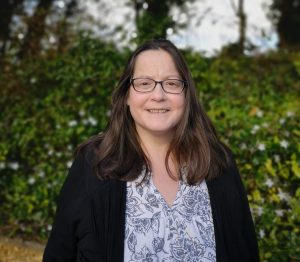Local Pastoral Ministers – the hidden frontline
Local Pastoral Ministers (LPMs) are a unique group of people quietly enriching our county by loving their neighbours with care and compassion. Offering tremendous support to the pastoral work of our clergy, LPMs are highly valued for their ability to come alongside people and simply listen. They don’t fix things or give advice, but they understand the healing power of making space for people to talk.
Sarah Welply, Project Officer for Pastoral Training and Support for Truro Diocese, says, “LPMs are wonderful to work with. They rarely see the qualities they have in themselves yet offer so much to their parishes.”
Sarah Welply, Project Officer for Local Pastoral Ministers
“Local Pastoral Ministers are wonderful to work with. They rarely see the qualities they have in themselves yet offer so much to their parishes,” says Sarah Welply
There are over 300 LPMs across Cornwall, quietly on the frontline fulfilling one of Jesus’ greatest commands, “To love one another as I have loved you.”
Key skills training for Local Pastoral Ministers
Sarah manages the diocesan pastoral training programme for lay people. Delivered locally over six weeks, it covers key skills that can really help. “Our pastoral ministers do an amazing job and we want them to feel as prepared as they can be when out and about in their parishes. It’s impossible to know what situation they might be walking into but there are certain key skills that will always be helpful.”
One such skill is active listening, so that those being visited feel they are being heard. That would include not taking notes during the visit. It’s hard to be fully present if you’re juggling listening with note-taking. But remembering what was said afterwards can also be tricky. No one wants to feel as if everything that was said on a previous encounter has been forgotten, but that you can pick up where you left off. So the active listening training also helps with memorising conversations, as well as strategies to make sure what is being heard is actually being said. Often it helps to clarify even to the speaker what has been talked about, and for them to hear their own words and thoughts out loud. Successful continuity also gives reassurance that situations are not forgotten but held in prayer.
Make space for listening
The training encourages pastoral ministers to consider loss and what that can mean. Most people experience loss of some kind – loss of a job, loss of status, loss of partner through separation, loss of independence, home or even purpose in life. And, of course, loss of a loved one. “Talking can help with that loss, just being able to open up to someone who is really listening can help to lessen the pain a little,” says Sarah. “The training aims to equip pastoral ministers with strategies to put people at their ease at times when even putting one foot in front of the other can seem an impossible task.”
“The training aims to equip pastoral ministers with strategies to put people at their ease at times when even putting one foot in front of the other can seem an impossible task.”
Commissioning Service at Truro Cathedral
Once the course is completed, and safe-guarding issues have been addressed, the pastoral ministers are commissioned in a special service and then sent out into the parishes. At the beginning of February there will be a celebratory service of thanks for both Local worship Leaders and Local Pastoral Ministers. The service will include the commissioning and re-commissioning of Local Pastoral Minsters. Ministers are re-commissioned every five years and this year sees the roll out of Living Water, a programme that will take Sarah and colleague, Mandy Wells, to every pastoral team in the diocese. “We really do value our pastoral ministers and want to support them in all they do. Living Water will give everyone the chance to re-appraise what they are doing, share the good things that are happening and reinforce effective accountability.”
Local Pastoral Ministers more than good neighbours
Visiting people in their homes on behalf of the church isn’t the same as simply popping in to check on friends. It’s a difference that LPMs are asked to consider. Of course, you never stop being a good neighbour, but it wouldn’t be possible for an LPM to do the shopping or go to the bank for someone they were visiting, or even give them a lift in their car unless they had specific insurance. It might seem as if the world is topsy-turvy but when a pastoral minister is representing the church, the church holds the best interests of everyone very closely.
One of the privileges of a pastoral minister is offering Holy Communion to those who cannot manage coming to church. Anne Lawrence, who was awarded a St PIran Cross for her contributions to pastoral ministry says, “Some people might not have seen anyone for a couple of days, so it’s very special to be able to take church to them. God is where we meet him, it doesn’t have to be at a holy altar.”
Anne Lawrence
“Some people might not have seen anyone for a couple of days, so it’s very special to be able to take church to them. God is where we meet him, it doesn’t have to be at a holy altar.”
Being a local pastoral minister isn’t always about visiting people at home; it can include visiting people in hospital, a care home or even while working as a parish nurse, like in Goran haven. Many pastoral ministers do some additional training that helps to extend their reach into the community. Such training can include bereavement, end of life care and living with depression, mental health issues, disability or dementia. Where possible, pastoral ministers will link with other agencies across Cornwall, like Age UK, memory Cafes or local GPs. Pastoral work is key to the success of the Oasis Centre in St Columb Major where they run multiple activities to combat loneliness. In St Austell, pastoral workers stride out with walkers through their social prescribing programme. In Stoke Climsland, the pastoral team come alongside students from the Duchy College, helping them to get to grips with job applications.
Local pastoral ministry is indeed a frontline role. It requires sensitivity, wisdom and empathy and can have a profound effect on those being ministered to. And kindness breeds kindness. One LPM, Keith, decided to become an LPM himself after receiving visits from his local ministry team after his wife died.
As a diocese we are very thankful for our Local Pastoral Ministers and cherish the contribution they make to the pastoral care of our county. The Commissioning Service will be held on Saturday February 2nd, at Truro Cathedral







